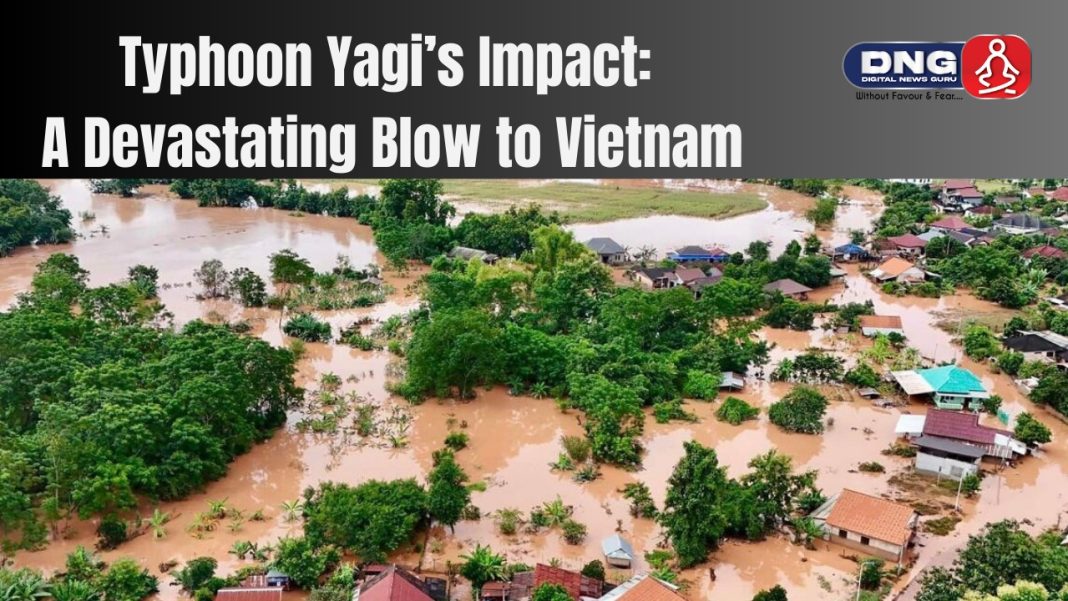DIGITAL NEWS GURU INTERNATIONAL DESK:
Typhoon Yagi’s Impact: A Devastating Blow to Vietnam
Typhoon Yagi, which made landfall in Vietnam in September 2024, has left a trail of destruction in its wake. Hitting the northern regions, particularly Yen Bai province, it has triggered historic flooding, displacing over 59,000 people.
One of the most shocking incidents involved the collapse of the Phong Chau Bridge, where a truck plunged into the river, leaving 13 people missing. Rescue operations are ongoing as authorities struggle to cope with the devastation brought by the floods, which have submerged vast areas of Hanoi and other regions.
The Aftermath of Typhoon Yagi
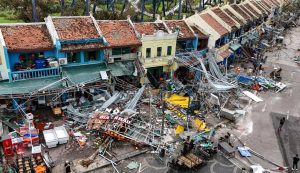
The intensity of Typhoon Yagi was unexpected, as it brought relentless rain and wind speeds exceeding 120 kilometers per hour, devastating infrastructure, homes, and crops. In the worst-hit areas, entire communities were inundated by floodwaters, leaving thousands of families homeless. Emergency shelters have been set up, but many affected residents are still awaiting assistance as roads remain submerged, and access to remote areas is limited.
The storm’s intensity can be attributed to the broader climate changes that have exacerbated the frequency and severity of such extreme weather events in Southeast Asia. The aftermath of Yagi has raised questions about Vietnam’s preparedness for such natural disasters, as the typhoon has overwhelmed disaster management agencies and infrastructure. While Vietnam is no stranger to typhoons, Yagi’s unprecedented impact has caught the nation off guard, putting the government under pressure to bolster its disaster response mechanisms.
Collapse of Phong Chau Bridge
One of the most tragic outcomes of Typhoon Yagi was the collapse of the Phong Chau Bridge, which has become a symbol of the storm’s destructive power. The bridge, a vital connection between northern provinces, collapsed under the force of rising river levels and pressure from debris swept up in the floods. A truck that was attempting to cross the bridge at the time of its collapse fell into the river, leading to the disappearance of the driver and 12 other people who were on or near the bridge when it fell.
Search and rescue operations have been launched, but efforts are being hampered by strong currents and poor visibility. Local authorities have prioritized finding the missing individuals, but hope is dwindling as time passes. The bridge collapse has also highlighted the fragile nature of Vietnam’s rural infrastructure, which is often unable to withstand extreme weather events.
Rescue and Relief Operations
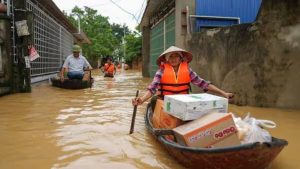
In response to the disaster, the Vietnamese government has mobilized emergency services, military units, and volunteers to aid in rescue and relief efforts. Helicopters have been deployed to airdrop supplies to isolated communities, while boats are being used to evacuate people from flood-affected areas. The government has also called on international aid organizations for assistance, as local resources are stretched thin by the scale of the disaster.
However, the relief efforts have faced significant challenges. In many areas, roads have been completely washed away, making it nearly impossible for ground-based relief teams to reach those in need. Additionally, communication lines have been disrupted, leaving many rural areas cut off from the outside world. Rescue teams are racing against time to reach those trapped in remote villages before conditions worsen.
Economic and Agricultural Impact
Beyond the immediate humanitarian crisis, Typhoon Yagi has dealt a significant blow to Vietnam’s economy, particularly its agricultural sector. The northern region, where the typhoon struck hardest, is a key agricultural hub for the country, producing rice, fruits, and vegetables. Fields have been submerged, with many crops completely destroyed. Farmers who were preparing for the upcoming harvest season now face ruin, as the floodwaters have rendered vast tracts of land unusable.
Experts estimate that the economic damage caused by Typhoon Yagi could reach billions of dollars. The agricultural losses alone are expected to significantly impact food supply chains in Vietnam, potentially leading to food shortages and higher prices in the coming months. Additionally, the destruction of infrastructure, including roads, bridges, and power lines, will require extensive rebuilding efforts, further straining the national economy.
Environmental and Climate Implications
Typhoon Yagi’s impact also brings attention to the broader issue of climate change and its role in intensifying natural disasters. Southeast Asia, including Vietnam, is particularly vulnerable to the effects of global warming, with rising sea levels and increased storm intensity posing significant threats to coastal and riverine communities.
Environmental experts have warned that without significant action to address climate change, storms like Yagi will become more frequent and more severe. The Vietnamese government has made strides in recent years to improve its disaster preparedness and reduce carbon emissions, but more needs to be done to mitigate the long-term risks posed by climate change. The destruction caused by Typhoon Yagi underscores the urgent need for global cooperation on climate action.
International Response
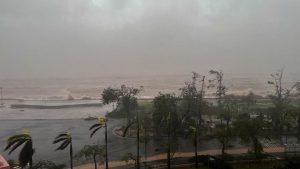
The international community has expressed solidarity with Vietnam in the wake of Typhoon Yagi. Countries like Japan, South Korea, and the United States have pledged financial and logistical support to aid in recovery efforts. Humanitarian organizations such as the Red Cross and the United Nations have also offered assistance, focusing on providing clean water, food, and medical supplies to the affected regions.
While the international aid is crucial, many have called for long-term investments in disaster preparedness and infrastructure development in Vietnam and other vulnerable nations. Building resilient communities that can withstand the impacts of climate change is seen as essential to preventing future disasters on this scale.
Conclusion
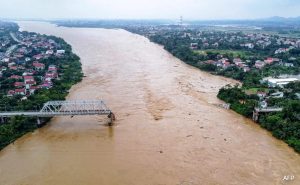
Typhoon Yagi has left a profound mark on Vietnam, both in terms of immediate devastation and long-term challenges. The loss of life, displacement of thousands, and destruction of vital infrastructure serve as a stark reminder of the power of nature and the vulnerabilities that exist in the face of climate change. As Vietnam begins the long process of recovery, the lessons learned from this disaster will likely shape the country’s approach to disaster preparedness and climate resilience in the years to come.
YOU MAY ALSO READ: Viral Incident in Chhattisgarh: Schoolgirls Drinking Beer in Classroom!



